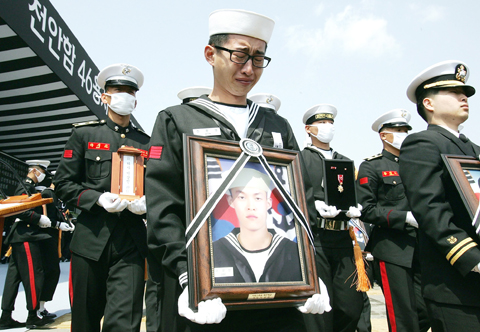|
ˇ@
South Korea lays to rest victims of
warship sinking
NO FORGIVE AND FORGET: At the funeral for those killed
aboard the ˇĄCheonan,ˇ¦ the navy chief of staff said the country could not sit
idly by in the face of an attack
AP, DAEJEON, SOUTH KOREA
Friday, Apr 30, 2010, Page 5
ˇ@

Survivors of the Cheonan sinking carry the
portraits of deceased comrades during a funeral ceremony yesterday in Pyeongtaek,
South Korea.
PHOTO: EPA
South Korea laid to rest 46 sailors killed in the sinking of a navy warship
during an emotional and solemn burial yesterday, as officials vowed retaliation
against those responsible for what many believe was a North Korean attack.
Wailing families placed white chrysanthemums, burned incense and bowed in front
of the framed photos of the men before their cremated ashes were buried at the
countryˇ¦s national cemetery in the central city of Daejeon. Buddhist and
Christian clergy offered prayers, a navy band played a dirge and troops fired a
rifle salute.
Some mothers clad in black traditional Korean mourning dress wailed
uncontrollably, touching photos of their sons and their urns wrapped in white
cloth.
ˇ§Itˇ¦s your mother! Please answer me! Please answer me!ˇ¨ one mother shouted.
The sailors went down with the 1,200-tonne Cheonan near the tense western sea
border with North Korea on March 26 shortly after it was split in two by what
investigators believe was an underwater blast from outside the ship.
Fifty-eight people survived the disaster, and the bodies of 40 of the sailors
were recovered, while six others remain unaccounted for and are presumed dead.
Hair and nails from the missing were burned and those ashes were among those
buried yesterday. Seamen and air force pilots in South Korea are required to
submit bits of hair and nail in case they die in action and their remains cannot
be recovered to ensure there is something to be buried in line with Confucian
tradition.
South Korea has not directly blamed its Cold War-era rival North Korea, but
suspicion has focused on Pyongyang given its history of provocations and attacks
on the South. South Koreaˇ¦s defense minister said this week the blast was most
likely caused by a torpedo attack. North Korea has denied any role.
The shipˇ¦s two main pieces have been hoisted, with investigators examining them
to find any clues to the cause of the blast. However, analysts such as Paik Hak-soon
at the private Sejong Institute said the exact reason may never be known.
Earlier yesterday, sirens blared across South Korea when the funeral started at
the 2nd Fleet headquarters in Pyeongtaek, south of Seoul, the shipˇ¦s home base.
Warships anchored there sounded whistles, and seamen aboard saluted when the
vehicles carrying the ashes left for the cemetery. About 3,000 white and black
balloons were released into the air.
A somber South Korean President Lee Myung-bak and his wife, Kim Yoon-ok ˇX who
joined 2,800 mourners at the ceremony ˇX paid homage to the sailors, while
buglers played taps. Former South Korean president Chun Doo-hwan, lawmakers and
military leaders also paid respects to those who died in one of South Koreaˇ¦s
worst naval disasters.
The name of each sailor was read out while Lee, clad in a black suit and tie,
placed military decorations on a giant altar below photos of each man. They were
all posthumously promoted by one rank earlier this week.
ˇ§We cannot forgive this and must not forgive it and must not forget it,ˇ¨ Navy
Chief of Staff Kim Sung-chan said in a speech at the funeral. ˇ§We will never sit
idly by in the face of whoever inflicted huge pain to our people.ˇ¨
Military retaliation against Pyongyang, however, is considered unlikely as it
could lead to major conflict and frighten away investors at a time when South
Korea is recovering fast from the global financial meltdown and prepares to hold
a summit of leaders from the G20 in November.
ˇ§A military response is both unrealistic and impossible,ˇ¨ said Kim Yong-hyun, a
North Korea expert at Seoulˇ¦s Dongguk University. ˇ§That would further deepen
military tension on the Korean peninsula.ˇ¨
The Cheonan was on a routine patrol before it sank near the disputed western sea
border, a scene of three bloody sea battles between the rival Koreas that remain
locked in a state of war since their 1950 to 1953 conflict ended in a truce
instead of a peace treaty.
North Korea has waged a slew of attacks against South Korea, including a 1987
downing of a South Korean passenger plane that killed all 115 people on board,
one of the reasons the country is suspected of involvement. South Korea plotted
militarily retaliations in some cases, but the plans were never carried out.
In central Seoul people gathered yesterday at a plaza to remember the Cheonan
sailors, placing chrysanthemums on an altar where photos of the dead were
placed.
ˇ§I feel empty,ˇ¨ said mourner Lee Yoon-suk, tears rolling down her cheeks. ˇ§I
truly hope they rest in peace in heaven.ˇ¨
One of the pictures drew special interest as accumulated rainwater that had
fallen on Tuesday and Wednesday dripped over it.
On-lookers paid their respects by wiping the water from the sailorˇ¦s face,
telling him not to cry.
Flags in South Korea are flying at half-staff and many government buildings in
Seoul have hung large black-and-white placards reading: ˇ§We will not forget your
honorable sacrifice.ˇ¨
ˇ@
|
![]()
![]()
![]()